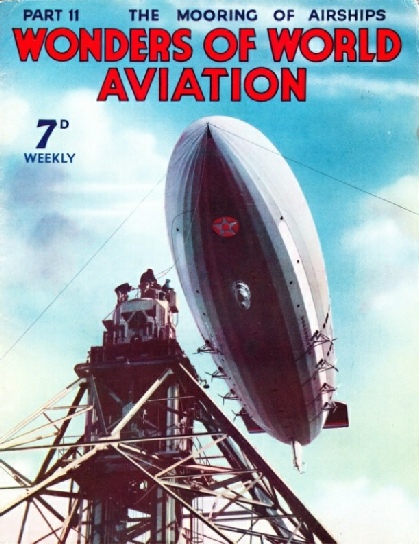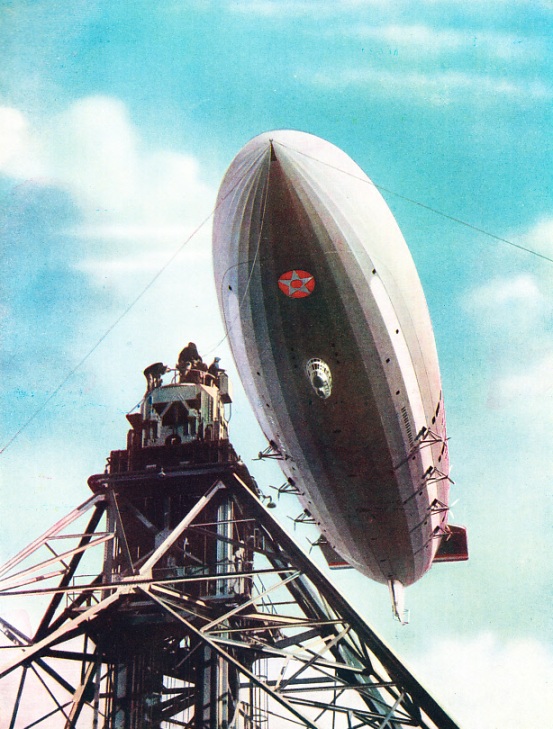
© Wonders of World Aviation 2015-


Part 11
Part 11 of Wonders of World Aviation was published on Tuesday 17th May 1938, price 7d.
This part included a colour plate showing the United States airship “Macon” being moored to the mast at Lakehurst, New Jersey. It formed part of the article on The Mooring of Airships.
The plate also formed the cover design for this part.
The Cover
The subject of our cover picture this week is the United States airship “Macon” being moored to the mast at Lakehurst, New Jersey.

Contents of Part 11
New Guinea Gold (Part 2)
Commercial aviation has assisted in the opening up of the goldfields in the Mandated Territory of New Guinea. This chapter is concluded from part 10.
Lighting the Modern Airport
Equipment that helps to make night flying safe. Not many years have elapsed since even the largest airports closed down completely during the night. Recently, however, great advances have been made in the lighting of aerodromes, and a specialized section of the science of illumination has developed some interesting and efficient devices with the object of making night flying safe.
Handley Page: Pioneers of Large Aircraft
The aeronautical achievements of Handley Page, Ltd, are important links in the story of aviation. The original company founded one of Great Britain's first aircraft factories. It has been responsible for the slotted wing. The name of Handley Page was associated with the first passenger and freight service to operate between England and the Continent; and during the war of 1914-18 Handley Page designs had a profound effect on strategy. The work of the Handley Page Company is described in this chapter which pays a well-deserved tribute to the accomplishments of this firm.
Air Travel to the Continent
Rapid transport for passengers and freight is the aeroplane’s most important contribution to civilization. A passenger wishing to fly from Croydon to the Continent has a wide choice of air lines. Beside the British services there are several foreign lines. These include the German DLH, the Dutch KLM, Air France, the Belgian Sabena, the Swedish Aero-transport line, Swissair, and the Danish DDL. This chapter describes two trips made to the Continent by air liner illustrating the advanced stage of development which air travel of today has reached.
The Mooring of Airships
Great Britain inaugurated the practice of mooring airships in the open instead of returning them to their sheds after each flight. Airship mooring may be divided into three classes; mooring on the surface of land or water, mooring to a mast and mooring in the air by means of one or more anchoring wires.
The US Airship Macon Being Moored
THE U.S. AIRSHIP MACON being moored to the mobile mast at Lakehurst, New Jersey. The Macon was built in 1933 and had an overall length of 785 feet. Her diameter was 132.9 feet and capacity 6,500,000 cubic feet. Powered by eight Maybach engines having a total horse-power of 4,480, she had a complement of eighty-three and carried six fast fighting aeroplanes. The Macon was lost off the California coast in February 1935.
Australia’s Civil Aviation (Part 1)
The aeroplane is playing an important part in the development of vast areas of Australia previously hampered by lack of transport. Australian civil aviation has progressed on unusual lines; for in most countries the first air services linked the centres of population, whereas Australia’s first aviation companies began in remote regions where no other form of swift transport existed. In this chapter the development of Australia’s civil aviation is described. The article is concluded in part 12.
This is the third article in the series Air Routes of the World.
